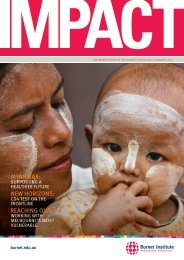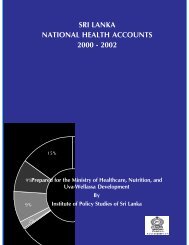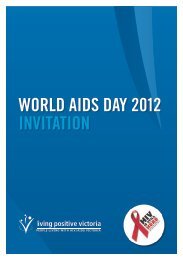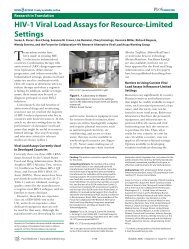Illicit Drug use in the Asia Pacific Region - Burnet Institute
Illicit Drug use in the Asia Pacific Region - Burnet Institute
Illicit Drug use in the Asia Pacific Region - Burnet Institute
Create successful ePaper yourself
Turn your PDF publications into a flip-book with our unique Google optimized e-Paper software.
Situational analysis of illicit drug issues and responses <strong>in</strong> <strong>the</strong> <strong>Asia</strong>–<strong>Pacific</strong> region<br />
xxii<br />
A concern of <strong>Pacific</strong> Island authorities is that<br />
<strong>the</strong> development of <strong>the</strong> cannabis <strong>in</strong>dustry<br />
may allow for profits to be <strong>in</strong>vested <strong>in</strong><br />
o<strong>the</strong>r commodities such as <strong>the</strong> production<br />
of methamphetam<strong>in</strong>es . The <strong>Pacific</strong> Islands<br />
region is develop<strong>in</strong>g <strong>in</strong>to a significant transit<br />
and potential consumption area for crystal<br />
methamphetam<strong>in</strong>e . For example, <strong>the</strong>re was a<br />
large seizure of a crystal methamphetam<strong>in</strong>e<br />
‘super laboratory’ <strong>in</strong> Fiji on 9 June 2004 .<br />
The major form of traffick<strong>in</strong>g, for <strong>the</strong> six<br />
countries reviewed, is transhipment: drugs<br />
produced elsewhere transit <strong>Pacific</strong> Islands<br />
for <strong>the</strong> dest<strong>in</strong>ation market . The geographic<br />
position of countries <strong>in</strong> <strong>the</strong> <strong>Pacific</strong> region<br />
facilitates <strong>the</strong> drug trade, both eastbound<br />
and westbound throughout <strong>the</strong> region .<br />
South American coca<strong>in</strong>e is transported <strong>in</strong>to<br />
Sou<strong>the</strong>ast <strong>Asia</strong> and Australia, while Sou<strong>the</strong>ast<br />
<strong>Asia</strong>n hero<strong>in</strong> and methamphetam<strong>in</strong>e<br />
are transported by couriers <strong>in</strong>to Canada, and<br />
to a lesser extent <strong>in</strong>to <strong>the</strong> United States .<br />
There have been reports of a number of<br />
large seizures <strong>in</strong> <strong>the</strong> region . S<strong>in</strong>ce <strong>the</strong> drug<br />
market <strong>in</strong> <strong>the</strong> region is small, shipments of<br />
large quantities are reported to <strong>in</strong>dicate that<br />
<strong>the</strong> drugs are dest<strong>in</strong>ed for larger markets .<br />
Availability and demand for coca<strong>in</strong>e rema<strong>in</strong><br />
limited <strong>in</strong> Oceania, with <strong>the</strong> exception of<br />
Australia . Seizures at <strong>the</strong> Australian border<br />
<strong>in</strong> 2001 doubled from <strong>the</strong> preced<strong>in</strong>g year .<br />
Seizures have been made <strong>in</strong> recent years <strong>in</strong><br />
Tonga and Fiji, and seizures <strong>in</strong> Australia have<br />
also <strong>in</strong>dicated that <strong>the</strong> drugs transited some<br />
<strong>Pacific</strong> Islands . Large seizures of hero<strong>in</strong> have<br />
been made <strong>in</strong> Vanuatu and Fiji, dest<strong>in</strong>ed for<br />
o<strong>the</strong>r markets .<br />
The concern for <strong>the</strong> <strong>Pacific</strong> region is, if large<br />
amounts of illicit drugs are mov<strong>in</strong>g through<br />
local communities, <strong>the</strong>n seepage of <strong>the</strong> drugs<br />
<strong>in</strong>to those communities will result and <strong>the</strong><br />
social impacts of drug dependency will be<br />
experienced .<br />
<strong>Drug</strong>-related crime<br />
Official law enforcement figures could not be<br />
obta<strong>in</strong>ed for this review . Information about<br />
drug-related crime for <strong>the</strong> region was derived<br />
from various sources <strong>in</strong>clud<strong>in</strong>g newspapers,<br />
case studies and regional reviews . Concerns<br />
<strong>in</strong>clude:<br />
• violence aga<strong>in</strong>st women and family, particularly<br />
<strong>in</strong> Melanesian countries (Papua New<br />
Gu<strong>in</strong>ea, Solomon Islands, Fiji), after ab<strong>use</strong><br />
of cannabis and home-brewed alcohol;<br />
• significant association between alcohol<br />
consumption and cannabis smok<strong>in</strong>g with<br />
crimes committed by youth;<br />
• <strong>in</strong> Papua New Gu<strong>in</strong>ea serious law and<br />
order issues prevail — murders, armed<br />
robberies, rape and car jack<strong>in</strong>g are daily<br />
occurrences;<br />
• corruption and white collar crimes are written<br />
about constantly <strong>in</strong> <strong>the</strong> newspapers;<br />
• <strong>the</strong>re are particular concerns regard<strong>in</strong>g <strong>the</strong><br />
association between cannabis cultivation<br />
and <strong>the</strong> trade for illegal guns;<br />
• money launder<strong>in</strong>g of proceeds of illicit<br />
drug traffick<strong>in</strong>g .<br />
Agreements and treaties<br />
Fiji and Tonga are party to all three <strong>in</strong>ternational<br />
drug conventions, <strong>the</strong> 1961<br />
Convention on Narcotics <strong>Drug</strong>s, <strong>the</strong> 1971<br />
Convention on Psychotropic Substances,<br />
and <strong>the</strong> 1988 Convention aga<strong>in</strong>st <strong>Illicit</strong><br />
Traffick<strong>in</strong>g <strong>in</strong> Narcotic <strong>Drug</strong>s and Psychotropic<br />
Substances . Samoa and Vanuatu are<br />
not party to any of <strong>the</strong> Conventions . The<br />
Solomon Islands have ratified only <strong>the</strong> 1961<br />
Convention on Narcotics <strong>Drug</strong>s . Papua New<br />
Gu<strong>in</strong>ea has ratified <strong>the</strong> 1961 and 1971<br />
Conventions and adherence to <strong>the</strong> 1988<br />
Convention is under discussion .<br />
<strong>Region</strong>al/country illicit drug<br />
control policy and legislation<br />
Presently, <strong>the</strong>re is no overall regional or<br />
country-based illicit drug policy <strong>in</strong> <strong>the</strong><br />
<strong>Pacific</strong> . Moreover, <strong>the</strong> <strong>in</strong>ability of current<br />
illicit drug legislation with<strong>in</strong> <strong>the</strong> region to<br />
provide a common base for law enforcement<br />
agencies to operate from both a national<br />
and a regional basis has been noted with<br />
some concern at <strong>the</strong> Forum <strong>Region</strong>al Security<br />
Committee (FRSC) meet<strong>in</strong>g . In 2002, a jo<strong>in</strong>t<br />
work<strong>in</strong>g group was established to address this<br />
complexity and to beg<strong>in</strong> to devise a common<br />
approach to illicit drug control across <strong>the</strong><br />
<strong>Pacific</strong> . The work<strong>in</strong>g group has developed<br />
new legislation for illicit drug control . The<br />
purpose of <strong>the</strong> <strong>Illicit</strong> <strong>Drug</strong> Control Bill is to<br />
repeal exist<strong>in</strong>g laws and put <strong>in</strong> place laws<br />
address<strong>in</strong>g aspects of illicit drugs trade that<br />
have not o<strong>the</strong>rwise been addressed under<br />
current laws, or that require streng<strong>the</strong>n<strong>in</strong>g<br />
to allow for more effective <strong>in</strong>vestigation and<br />
enforcement .<br />
The Forum Secretariat leaders have signed<br />
off on <strong>the</strong> Bill and endorsed its adaptation<br />
to local environments . The Bill calls for<br />
illicit drug legislation to be consistent <strong>in</strong> <strong>the</strong><br />
region with respect to offences, penalties,<br />
classes of illicit drugs, and <strong>in</strong>vestigation and<br />
enforcement (search, seizure and forfeiture) .<br />
The <strong>Illicit</strong> <strong>Drug</strong> Control Bill has been <strong>use</strong>d as<br />
<strong>the</strong> basis of legislation <strong>in</strong> Tonga and Fiji (as<br />
well as <strong>in</strong> <strong>the</strong> Nor<strong>the</strong>rn Mariana Islands) .<br />
Law enforcement<br />
response to illicit drugs<br />
In general, <strong>the</strong> pr<strong>in</strong>cipal law enforcement<br />
agencies <strong>in</strong> <strong>the</strong> region are <strong>the</strong> Police and<br />
Customs and Excise Departments, and Immigration<br />
. However, more recently <strong>the</strong> region<br />
has taken a whole-of-government approach<br />
to transnational crime issues and is work<strong>in</strong>g<br />
closely with <strong>the</strong> Navy, Defence, Police and<br />
Customs .<br />
Due to a lack of resources and tra<strong>in</strong><strong>in</strong>g and <strong>the</strong><br />
constra<strong>in</strong>ts of <strong>in</strong>effective legislation, <strong>the</strong> police<br />
and customs adm<strong>in</strong>istrations have difficulty<br />
fulfill<strong>in</strong>g <strong>the</strong>ir extended role as drug enforcement<br />
agents and generally cooperate with<br />
o<strong>the</strong>r countries on illicit drugs enforcement<br />
as needed .<br />
Treatment responses and services<br />
There is limited publicly available documented<br />
<strong>in</strong>formation on prevention and treatment<br />
<strong>in</strong>terventions for drug <strong>use</strong>rs <strong>in</strong> <strong>the</strong> <strong>Pacific</strong> .<br />
Discussions with key <strong>in</strong>formants po<strong>in</strong>t to <strong>the</strong><br />
same conclusion: with <strong>the</strong> exception of <strong>the</strong><br />
nor<strong>the</strong>rn <strong>Pacific</strong>, programs or <strong>in</strong>terventions<br />
do not specifically address drug <strong>use</strong>rs . <strong>Drug</strong><br />
<strong>use</strong>/ab<strong>use</strong> issues are generally <strong>in</strong>corporated<br />
as part of life counsell<strong>in</strong>g or o<strong>the</strong>r programs<br />
undertaken by NGOs and churches: topics<br />
<strong>in</strong>clude employment, family conflict, sexually<br />
transmitted <strong>in</strong>fections, marijuana <strong>use</strong>/ab<strong>use</strong>,<br />
alcohol (particularly home-brew), unplanned<br />
pregnancies and domestic violence .<br />
In Papua New Gu<strong>in</strong>ea <strong>the</strong> psychiatric units<br />
<strong>in</strong> Port Moresby General Hospital and some<br />
o<strong>the</strong>r hospitals <strong>in</strong> <strong>the</strong> prov<strong>in</strong>ces, and <strong>the</strong><br />
National Psychiatric Hospital located at<br />
Laloki (on <strong>the</strong> outskirts of Port Moresby)<br />
treat some patients whose condition is l<strong>in</strong>ked<br />
to drug <strong>use</strong> (ma<strong>in</strong>ly alcohol and cannabis) .<br />
Like Papua New Gu<strong>in</strong>ea, treatment of drug<br />
<strong>use</strong> issues <strong>in</strong> Fiji and <strong>the</strong> Solomon Islands is<br />
conducted by general or psychiatric hospitals .<br />
For example, St Giles <strong>in</strong> Fiji treats people who<br />
experience cannabis-<strong>in</strong>duced psychoses .<br />
xxiii<br />
Executive summary









